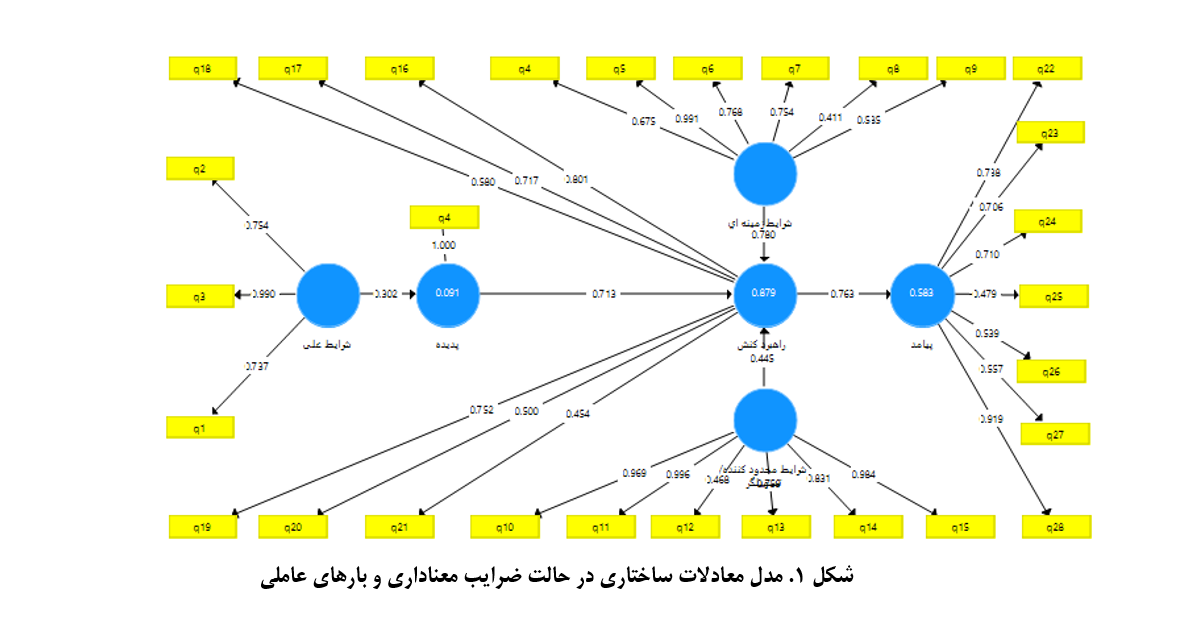Validation of Organizational Culture Indicators and Components in Iraqi Schools
Keywords:
Organizational Culture, Iraqi Schools, Education, ValidationAbstract
The objective of this study was to validate the indicators and components of organizational culture in Iraqi schools. This research was designed and conducted to address the gap in previous studies, which primarily focused on industrial and service organizations while paying less attention to schools and educational institutions. The current study employs a quantitative (descriptive-survey) method and is applied in nature. The statistical population includes all teachers and educational staff in the schools of Wasit County, Iraq. The sample size was determined to be 310 individuals using Morgan's table. The sampling method was simple random sampling. Data collection was carried out using a researcher-made questionnaire based on semi-structured interviews. The validity of the questionnaire was assessed through expert opinions, and its reliability was confirmed using Cronbach's alpha test. Data analysis was performed using the structural equation modeling (SEM) approach with the Smart PLS software. The results indicated that causal conditions with a factor loading of 2.32 and a t-value of 4.87, contextual conditions with a factor loading of 0.760 and a t-value of 5.25, intervening conditions with a factor loading of 0.667 and a t-value of 4.97, strategies with a factor loading of 0.445 and a t-value of 4.95, and outcomes with a factor loading of 2.32 and a t-value of 4.36 were significant. It can be concluded that the proposed organizational culture model for schools in Iraq is valid. Therefore, educational planners and policymakers can utilize the findings of this study to enhance organizational culture.
Downloads
References
Hofstede GH. Culture's Consequences: Comparing Values, Behaviors, Institutions, and Organizations Across Nations:
Sage Publications; 2001.
Hofstede GJ, Hofstede GJ, Minkov M. Cultures and Organizations: Software of the Mind. London: McGraw-Hill;
262 p.
Lothans C. Education, Cultures, and Societies. Yemeeni Doozi Sarhabi M, editor. Tehran: Shahid Beheshti University
Press; 2010.
Assoratgoon W, Kantabutra S. Toward a sustainability organizational culture model. Journal of Cleaner Production.
;400. doi: 10.1016/j.jclepro.2023.136666.
Pavlidou CT, Efstathiades A. The Effects of Internal Marketing Strategies on the Organizational Culture of Secondary
Public Schools. Evaluation and Program Planning. 2021;84. doi: 10.1016/j.evalprogplan.2020.101894.
Pedraza-Rodríguez JA, Ruiz-Vélez A, Sánchez-Rodríguez MI, Fernández-Esquinas M. Management Skills and
Organizational Culture as Sources of Innovation for Firms in Peripheral Regions. Technological Forecasting and Social
Change. 2023;191. doi: 10.1016/j.techfore.2023.122518.
Parsakia K, Namjoo K, Arjmand M, Sabzvand A, Rahyan H, Fazli A, et al. The mediating role of work engagement
in the relationship between psychological climate and productivity and job satisfaction in teachers. International Journal of
Innovation Management and Organizational Behavior (IJIMOB). 2022;2(2):8-23.
AlSaied MK, Alkhoraif AA. The role of organizational learning and innovative organizational culture for
ambidextrous innovation. The Learning Organization. 2024;31(2):205-26. doi: 10.1108/TLO-06-2023-0101.
Chalmers R, Brannan GD. Organizational Culture: StatPearls Publishing; 2024.
Jain MS. Workplace Ostracism, Organizational Culture, and Work-Life Balance Among Academicians – Navigating
EdTech Realms. Eatp. 2024:7551-61. doi: 10.53555/kuey.v30i5.4209.
Winata LRW. The Influence of Organizational Culture, Situational Leadership and Emotional Intelligence on
Organizational Commitment Through Job Satisfaction at PDAM Tirta Ardhia Rinjani, Central Lombok Regency. Journal of
Economics Finance and Management Studies. 2024;07(05). doi: 10.47191/jefms/v7-i5-17.
Kavala HB, Devi PG, Mandal S. Does Organizational Culture Matter for Shaping Up Hotel's Agility? An Empirical
Investigation. Global Health & Medical Tourism (GloHMT). 2019.
Zarei Matin H. Fundamentals of Organization and Management: A Contingency Approach. Tehran: University of
Tehran Press; 2018.
Goudarzi A, Gominian V. Principles, Basics, and Theories of Organizational Atmosphere. Isfahan: Jihad Daneshgahi
Publications; 2003.
Gorzelany J, Gorzelany-Dziadkowiec M, Luty L, Firlej K, Gaisch M, Dudziak O, et al. Finding links between
organisation's culture and innovation. PLOS One. 2021;16(10). doi: 10.1371/journal.pone.0257962.
Mikusova M, Klabusayova N, Meier V. Evaluation of Organisational Culture Dimensions and Their Change Due to
the Pandemic. Evaluation and Program Planning. 2023;97:1-13. doi: 10.1016/j.evalprogplan.2023.102246.
Deal TE, Kennedy AA. Corporate Cultures: The Rites and Rituals of Corporate Life. Harmondsworth: Perseus Books;
Schein E. Organizational Culture. Mahjoob ME, editor. Tehran: Fra Publications; 2010.
Flamholtz EG, Randle Y. Corporate Culture: The Ultimate Strategic Asset. Stanford, California: Stanford Business
Books; 2011.
Robbins SP. Organizational Theory: Structure and Organizational Design. Tehran: Ashraghi & Safar; 2011.
Aban Eh, Khodashenas MR, editors. The Role of Education in Scientific, Cultural, and Social Development. Second
National Conference on Challenges and Solutions for Development, Kahnooj; 2015.
Panahi. Cultural Development: A Necessity for Economic, Social, and Political Growth. Welfare and Social
Development Planning. 2015;7(22):1-23.
Nissani MR, Rameshgar R. The Role of University Cultural Activities in the Cultural Development of Society.
Cultural Engineering Journal. 2015;8(76):111-31.
Manafi Sharaf Abadi K, Zamani E. The Role of the Education System in the Cultural Development of Society. Cultural
Engineering Journal. 2012;7(73):135-51.
Babaei Fard A. Cultural and Social Development in Iran. Social Welfare Journal. 2019;10(37):7-56.
Akpa VO, Asikhia OU, Nneji NE. Organizational culture and organizational performance: A review of literature.
International Journal of Advances in Engineering and Management. 2021;3(1):361-72.
Zheng W. The Impact of Organizational Culture, Structure, and Strategy on Knowledge Management Effectiveness
and Organizational Effectiveness: University of Minnesota; 2005.

Downloads
Published
Submitted
Revised
Accepted
Issue
Section
License
Copyright (c) 2025 Journal of Study and Innovation in Education and Development

This work is licensed under a Creative Commons Attribution-NonCommercial 4.0 International License.










